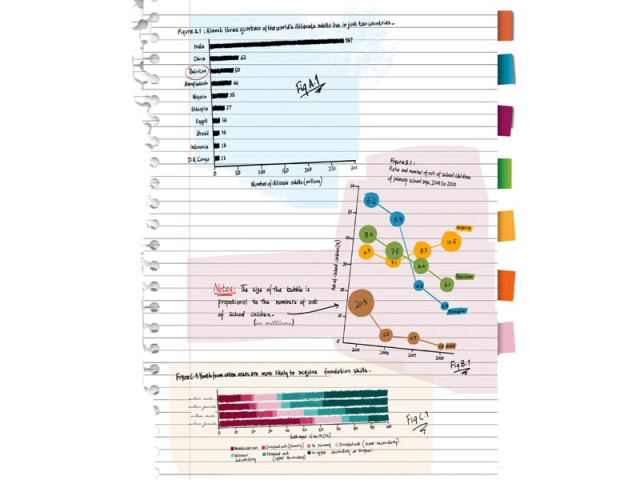As the world gallops ahead, Pakistan crawls towards education for all
Reduced spending means Pakistan has a long way to go, says Unesco report.

As the world gallops ahead, Pakistan crawls towards education for all
With three years to go until the 2015 deadline of meeting the Millennium Development Goals, every one in 12 of the world’s out-of-school children belongs to Pakistan, the United Nations Educational, Scientific, and Cultural Organisation (Unesco) says in its Global Monitoring Report on education for the year 2012.
Despite a promising global trend towards meeting the education for all (EFA) goal by the year 2015, some countries, including Pakistan, are a long way from achieving them, states the tenth report by Unesco launched in collaboration with Idara-e-Taleem-o-Aagahi (ITA) on Tuesday.
The event was presided over by Sindh Education Minister Pir Mazharul Haq.
Unesco’s provincial coordinator, Kazi Ayaz Mahessar, while sharing Pakistan-specific statistics, said Pakistan has the world’s second highest number of out-of-school children – up to 5.1 million, with two-third of them girls.
“Yet the country reduced its spending on education from 2.6% to 2.3% of gross national product over the decade, and the country allocated only 9% of government spending on education,” he said.
On literacy in adults, Pakistan has the world’s third largest illiterate population. The report states that around 49.5 million Pakistani adults are illiterate, with women comprising two-thirds of them. “Projections indicate that the number of illiterate adults will increase to 51 million by 2015,” said Mahessar.
The rural and urban divide in Pakistan is also significant as the share of 15- to 19-year-olds who have made it to upper secondary is roughly twice as high in urban areas as in rural areas.
Nearly half of rural females in the country have never been to school, while this is true for only 14% of urban males.
The report placed Pakistan 113th, out of 120 countries, in the EFA Development Index, stressing on a dire need for investment in the future of young boys and girls in three key domains: spending on education, its quality and skill-building initiatives.
Mahessar said that the long term effect of neglecting children’s education has left a huge skill deficit among young people. “The country needs to tackle an alarming unemployment rate of the youth and this could only be achieved through training and education,” Mahessar said.
He was seconded by Sindh Technical Education and Vocational Training Authority Director Operations Syed Nazar Ali who said that the unemployment rate of youth between ages 15 and 24 is three times higher than other age groups.
ITA Director Programmes, Baela Raza Jamil, added that over one in three young people in Pakistan have not completed primary school and as a result do not have the basic skills they need for work. “A total of 12 million 15- to 24-year-olds lack basic skills, which is the world’s second highest number in developing countries,” she said.
Jamil said that young people from disadvantaged backgrounds are least likely to have skills for decent jobs. “Over 70% of the richest young men and women have completed lower secondary school while only 16% of the poorest young men and fewer than 5% of the poorest young women have done so.”
As a provincial education minister whose tenure is about to end, Pir Mazharul Haq expressed his incredulity on statistics which portrayed that Pakistan has some of the worst education indicators globally. “The government is committed towards education and has invested in youth and skills through various interventions like no other government did before,” the minister said.
Published in The Express Tribune, December 5th, 2012.



















COMMENTS
Comments are moderated and generally will be posted if they are on-topic and not abusive.
For more information, please see our Comments FAQ